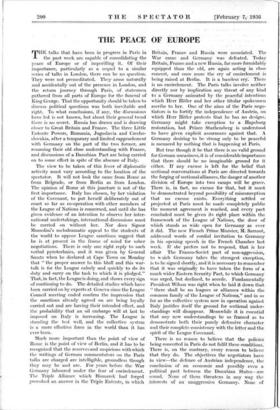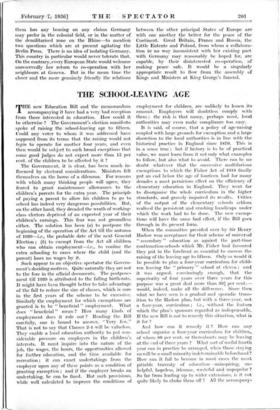THE PEACE
OF EUROPE THE talks that have been in progress in Paris in the past week are capable of consolidating the peace of Europe or of imperilling it. Of • their importance, particularly as a sequel to a similar series of talks in London, there can be no question. They were not premeditated. They arose naturally and accidentally out of the presence in London, and the return journey through Paris, of statesmen gathered from all parts of Europe for the funeral of King George. That the opportunity should be taken to discuss political questions was both inevitable and right. To what conclusions, if any, the discussions have led is not known, but about their general trend there is no secret. Russia has drawn and is drawing closer to Great Britain and France. The three Little Entente. Powers, Rumania, Jugoslavia and Czecho- slovakia, after a temporary and limited rapprochement with Germany on the part of the two former, are resuming their old close understanding with France, and discussions of a Danubian Pact are being carried on to some effect in spite of the absence of Italy.
The view to be taken of this fever of diplomatic activity must vary according to the location of the spectator. It will not look the same from Rome as from Belgrade, or from Berlin as from London. The opinion of Rome at this juncture is not of - the first importance. Italy has chosen, by her violation of the Covenant, to put herself deliberately out of court so far as co-operation with other members of the League of Nations is concerned, and until she has given evidence of an intention to observe her inter- national undertakings, international discussions must be carried on without her. Nor does Signor Mussolini's melodramatic appeal to the students of the world to oppose League sanctions suggest that he is at present in the frame of mind for sober negotiations. There is only one right reply to such verbal pyrotechnics, and it was given by General Smuts when he declared at Cape Town on Monday that " the proper answer to this bluff and this war- talk is for the League calmly and quickly to do its duty and carry on the task to which it is pledged." That, in fact, the League is doing, and shows every sign of continuing to do. The detailed studies which have been carried on by experts at Geneva since the League Council meeting ended confirm the impression that the sanctions already agreed on are being loyally carried out and are having their intended effect, and the probability that an oil embargo will at last be imposed on Italy is increasing. The League is standing the test well, and the collective system is a more effective force in the world than it has ever been.
Much more important than the point of view of Rome is the point of view of Berlin, and it has to be recognised that the reserves and suspicions with which the writings of German commentators on the Paris talks are charged are intelligible, groundless though they may be • and area For years before the War Germany laboured under the fear of encirclement. The Triple Alliance which Bismarck• had forged provoked an answer in the Triple Entente, in which Britain, France and Russia were associated. The War came and Germany was defeated. Today Britain, France and 'a new RusSia, far more fdrmidably eqUipped than the old, are again acting in close concert, and once more the cry of encirclement is being-raised at Berlin. It is a baselesS Cry: There is no encirclement. The Paris talks involve neither directly nor by implication any threat of any kind to' a 'Germany animated by the peaceful intentions which Herr Hitler and her other titular spokesmen ascribe to her. One of the aims of the Paris nego- tiators -is to fortify the independence of. Austria, on which Herr Hitler protests that he has no. designs. Germany might take exception to a Hapsburg restoration, but - Prince Starhemberg is understood to have given explicit assurances against that. A. Germany desiring to be strong only to be peaceful is menaced by nothing that is happening at Paris.
But true though it be that there is no valid ground for German uneasiness, it is of considerable importance that there should be no imaginable ground for it either. If any excuse is left for the belief -that sectional conversations at Paris are directed towards the forging of sectional alliances, the danger of another division of Europe into two camps will be grave. There is, in fact, no excuse for that, but it must be demonstrated beyond possibility of misconception that no excuse exists. Everything settled or projected at Paris must be made completely public the moment agreement is reached,. and every pact concluded must be given its right place within the framework of the League of Nations, the door of which stands as wide open for- Germany as ever it did. The new French Ptime Minister, M. Sarraut, addressed words of cordial invitation to Germany in his opening speech in the French Chamber last week. If she prefers not to respond, that is her affair The Franco-Soviet pact of non-aggresSiOn, to vOich Germany takes the strongest exception, is to be signed-shortly, and-it is necessary to _remember that it was originally to: have taken the form 'of a much wider Eastern Security Pact, to which Germany was urged, but declined, to accede. Fundamentally President Wilson was right when he laid it down that " there shall be no leagues or alliances within the common family of the League of Nations," and-in so far as the collective system now in operation 'against Italy justifies itself the ground for sectional under- standings will disappear. Meanwhile it is essential that any new understandings be so • framed as to demonstrate both their purely defensive character and their complete consistency with the letter and the spirit of the League Covenant.
There is no reason to believe that the policies being concerted in Paris do not fulfil these conditions': There is, on the contrary, every reason to believe that they do. The objectives the negotiators have in view—the defence of Austrian independence, the conclusion of an economic and possibly even a political pact between the 'Danubian States—are sound. None of- than. threatens in any way the interests of an: unaggressive Germany: None of them has any bearing on any claims Germany may prefer in the colonial field, or in the matter of the demilitarised zone on the Rhine—to mention two questions which are at present agitating the Berlin Press. There is no idea of isolating Germany. This country in particular would never tolerate that. On the contrary, every European State would welcome unreservedly her return to co-operation with her neighbours at Geneva. But in the mean time the closer and the more genuinely friendly the relations between the other principal States of Europe are with one another the better for the peace of the COntinent.: Great Britain, France and Russia, the Little Entente and Poland, from whom a collabora- tion in no way inconsistent with her existing pact with Germany may reasonably be hoped for, are capable, by their disinterested co-operation, of making peace safe. It would be a singularly appropriate result to flow from the assembly of Kings and Ministers at King George's funeral.















































 Previous page
Previous page